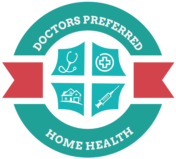Keeping Families Together
As our loved ones age, it can be challenging to decide how best to care for them. Many families struggle with the decision of whether to move their elderly family members to an assisted living facility or to provide care at home. At Doctors Preferred Home Health Care, we believe that home care is the best option for elderly care. Here’s why.
Keeping Families Together
Perhaps the most important benefit of home care is that it keeps families together. When an elderly family member moves into an assisted living facility, it can be challenging for family members to visit regularly. It can also be difficult for seniors to maintain connections with their families and friends.
Home care allows seniors to remain in their homes, surrounded by their families and loved ones. It provides families with peace of mind, knowing that their loved ones are receiving the care they need while remaining close by. At Doctors Preferred Home Health Care, we believe that keeping families together is essential, and we are committed to providing the highest quality care possible to help make this a reality.
Promoting Faster Recovery
Home care can also promote faster recovery from an illness or injury. When seniors receive care in a hospital or assisted living facility, they may become more prone to infections and illnesses due to exposure to other patients. Being at home, surrounded by familiar surroundings and loved ones, can help seniors feel more comfortable and relaxed, which can contribute to a quicker recovery time.
At Doctors Preferred Home Health Care, we provide skilled nursing care to seniors who require medical attention. Our team of trained nurses can monitor vital signs, administer medication, and provide wound care, all while ensuring that the patient is comfortable and happy in their own home. By receiving care in a familiar environment, seniors are more likely to heal faster and regain their independence sooner.
Peace of Mind for Family Members
Caring for an elderly family member can be a daunting task, especially for those who have other responsibilities such as work and children. Home care can provide peace of mind for family members, knowing that their loved one is in good hands and receiving the care they need.
At Doctors Preferred Home Health Care, we understand the challenges that families face when caring for an elderly loved one. Our team of caregivers is committed to providing compassionate care to our patients, allowing families to focus on other aspects of their lives. We offer a range of services, including personal care, medication management, and skilled nursing, all designed to provide the highest quality care possible. By choosing home care, families can rest assured that their loved one is safe and happy in their own home, surrounded by their family and friends.
Conclusion
In conclusion, home care is an excellent option for families who want to provide the best care possible for their elderly loved ones. At Doctors Preferred Home Health Care, we understand the challenges that families face when deciding on the best course of action for their loved ones. Our team of skilled nurses and caregivers is dedicated to providing personalized, compassionate care to our patients, allowing them to remain in their own homes and stay connected to their families and communities. Contact us today to learn more about our home care services and how we can help your family.




